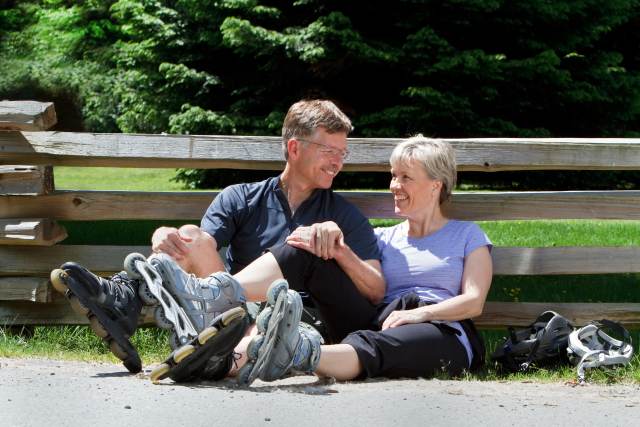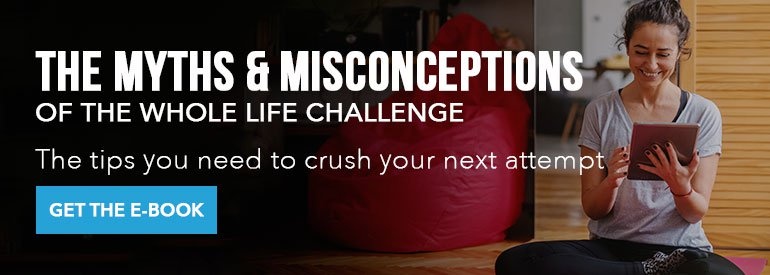 Reading Time: 6 minutes
Reading Time: 6 minutes6 Tips to Prep for the WLC
When I first did the Whole Life Challenge, back in 2012, I did it on my own with no team and starting with not really much knowledge of what I was getting into. Yes, I knew I was going to be committing to some sort of lifestyle change, but just how much effort that would involve was left for me to discover.
It was tough at first. I felt like I was thrown into the deep end of a pool. I had no choice but to quickly learn how to swim or at least keep myself afloat. Luckily, I had one lifeline, which was the clearly explained rules of the Challenge. I really studied them and used them to create a raft for myself – something I could rely on for support.
Having been doing the Challenge for several years now, I have come to understand what it takes to prepare for a good start and how crucial that good start is for a successful Challenge.
Although you, too, have access to that lifeline, as well as an incredible support network via the Official WLC Facebook group (also something that wasn’t there in 2012), based on what I have learned from my experiences, here are six tips to help you prep for the WLC:
1. Get in the Right Mindset
Mindset is such a buzzword, but what does it mean? Mindset is like a mental filter you use to process what is happening around you. It is your mindset that will influence how you react to a situation or how you understand information you receive.
Some mindset tips:
- View the WLC as an investment in your health and the development of positive habits.
- Decide that you will work hard and focus for the next six weeks.
- Accept that progress is measured in different ways and not just numbers on a scale.
- Understand that this is a learning process and small setbacks do not equal failure.
2. Set a Goal That Works for You
Now that you have an idea of how you want to approach the task ahead, it is time to set your goal(s). Take some time to figure out exactly what you hope to achieve in six weeks and write them down.
Some goal-setting tips:
- Keep the timeline in mind and set realistic goals (overcommitting will just lead to frustration and make it harder to sustain your habits once the Challenge is over).
- Be specific about what you want to achieve, why you want that as your goal, and how you hope to reach it.
- Break your long-term goal down into smaller daily or weekly targets to help you stay focused and consistent with your efforts.
3. Familiarize Yourself with the Rules
Yes, it’s a challenge and it has rules. The rules are set in place because every challenge needs structure as well as parameters to help you move out of your comfort zone.
- Read through the general rules of the WLC; the more familiar you are with them, the more confident you will be about following them.
- Understand the different nutrition levels of the WLC and choose the one that is a bit challenging but also manageable.
- Print out and study the nutrition list of the level you will be playing at.
- Allow yourself to accept the parameters set and don’t waste energy on resisting the rules.

4. Establish a Plan
Planning is not the same as goal setting. Goal setting is about what you want to achieve. Planning is about what you need to do to reach your goals. Here are a few planning tips:
Exercise and Mobility:
- Figure out (and write down) when you will exercise and mobilize.
- Decide what type of exercise and mobility practice you will do.
Nutrition:
- Set aside a specific time for meal planning (for me, 4:30-5:00pm on a Saturday; a lovely cup of tea, a couple of dates, some good music, and my list; I decide my meals for the week and write a grocery list accordingly).
- Schedule when you will go grocery shopping and when you will cook.
- Keep your meals simple – you don’t need to create a new dish for every meal
- Think different – have “dinner” for “breakfast” or “breakfast” for “dinner”; look at meals as times to fuel your body and replenish your energy.
Hydration:
- Decide how much water you need to drink each day.
- Measure out your water the night before so you have a visual target of how much you need to drink.
- Set reminders on your phone to go off throughout the day reminding you to hydrate.
Sleep:
- Decide how many hours of sleep you want to aim for each night.
- Determine what time you need to be in bed to hit that goal (don’t forget, naps count).
- Start getting ready for bed and winding down at least twenty minutes before your bedtime (if possible) or at least detach yourself from electronics to help you get into a more relaxed, unplugged state.
Well-Being Practice, Reflection, and Scoring:
- Set aside ten to fifteen minutes a day for yourself each day to use for your Well-Being Practice; even if you don’t need that amount of time (such as if the practice is listening to music, which you can do in your car), managing to allocate some quiet, alone time for yourself can be really invigorating.
- Set a specific time each day for when you’re going to log in to write down your Reflection and record your score; set a reminder on your phone until it becomes a habit.

5. Prepare for the Saturday Start
Every WLC begins on a Saturday. It may seem a bit cruel to start a challenge during a weekend (at least that’s what I used to think), but it’s a good opportunity to bypass the “I’ll start tomorrow” mentality. When Day 1 arrives, just start.
My one tip: start easing in to the Challenge the week before. Whether it is drinking more water, adjusting your bedtime routine, or setting up a workout plan, see the Saturday before the start of the Challenge as your “last weekend,” and then start working on your habits once the weekend is over. This gives you a nice warm-up period and a chance to get your mindset right, have your goals written down, and plan for the weeks ahead.
6. Finally, Trust the Process
The Whole Life Challenge provides you with a chance to focus on yourself and invest in your well-being. As with many investments, it only pays off if you give it time to settle and mature.
A few tips:
- Promise yourself you’ll be patient throughout the six weeks.
- Remind yourself that if you stumble, you can always get up and try again.
- Realize that life sometimes gets in the way, so just do the best you can.
One of the biggest lessons I learned from the WLC was that I was in control of my choices — whether it was the choice do something, avoid something, react to something, or let it go. That awareness was incredibly empowering.
The WLC gives you the opportunity to see how much you can accomplish when you put your mind to something and focus on the task at hand. Allow the Challenge to support you as you practice new habits and work toward living a healthier life.
How do YOU prep for the WLC? Let us know in the comments below.








